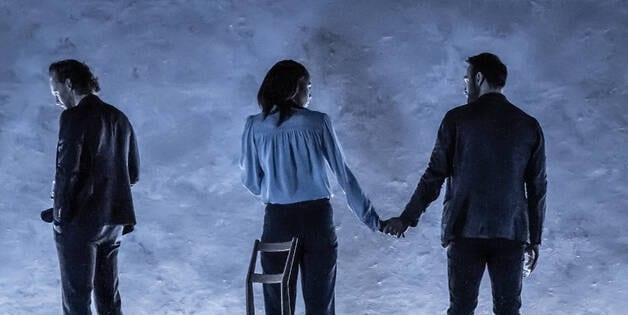Pinter’s Betrayal follows the lives of three artistic intellectuals involved in a love triangle. Emma is married to Robert but started secretly sleeping with his friend Jerry, although their tryst is eventually rumbled. The play delves into the past to compare the trio’s former youthful vigour with their present-day numbness and amorality.
For this production, a minimalist set is used to evoke Pinter’s condensed and unadorned dialogue. The opening conversation between Emma (Zawe Ashton) and Jerry (Charlie Cox) takes place inside a bare room rather than the original pub setting, which focuses our attention on the characters and how they interact with each other. Emma and Jerry’s staccato exchange about lost intimacy is punctuated by long silences; we are made to confront the awkward communication of these estranged lovers head-on.
Emma and Jerry reminisce, arguing over when and where certain past events occurred. This sets up an atmosphere of confusion and uncertainty; Zawe Ashton plays Emma as a forlorn and distant thinker while Charlie Cox plays Jerry as a self-involved and often contradictory fool – it seems that both their speech and personalities are now at cross-purposes.
Emma admits that the pressure she felt from having an affair moved her to confession. This greatly shocks and dismays Jerry since he had hoped to maintain a friendship with Robert, who orbits the pair on the perimeter of the stage like a cold satellite. Tom Hiddleston is mesmerising as Robert, even while lurking in the shadows: you can feel your eyes drawn to him, with all his gestures and slight expressions. He deftly plays this cuckolded husband as a stony-faced misanthrope who possesses the dry wit of a long-suffering man.
Sardonic humour pervades the romantic frustration in Betrayal. Serious narrative developments are not dealt with the appropriate gravity, like when we see the anti-climax of Robert’s response to the affair and Jerry’s manipulation of that moment into an opportunity for self-pity. There’s a sense that, for all their performances of etiquette and social convention, these characters are somewhat disconnected from reality –they don’t quite know how or what to express in response to situations.
The character out of the three who seems to be the most human and capable of sincere feeling is Emma. This is also suggested by the fact that Jerry and Rob are parasites who profit off their friend Casey’s literary talents’, which they have no qualms about doing; Emma has a different job –she is a gallery owner who proudly showcases artistic work. Zawe Ashton brings out the dreamy, painterly qualities of Emma’s journeys into recollection. In this production the cheerfully decorated rooms of the past only exist descriptively; they are brought into technicolour life by Emma’s eloquently referenced desire to return to them.
New scenes take us further back in time. Jerry and Robert converse over dinner at a restaurant in Italy with lots of profanity-strewn humour surrounding alcohol, their figures are silhouetted on the back wall. Feelings and thoughts are half-articulated or brushed under the carpet – Robert recalls reading Yeats in Torcello as a small triumph of escapism. We next see Jerry and Emma together in their bolthole, but the really amazing piece of acting comes right at the end, in the final flashback where we watch the love-drunk and excitable Jerry and Emma chat outside of a party – a point where the seed of suspicion is planted for Robert.
This production of Betrayal is stupendous because it showcases the emotional range of these characters across the years, travelling to key moments of the trio’s relationship where their attitudes towards each other shift – weaving sadness, romance and humour together; Betrayal expertly uses reverse chronology to show how time effaces passion.

